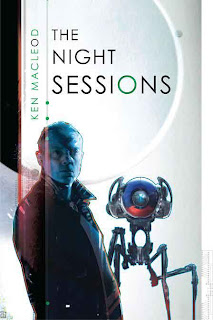

The championship of the Spring 2012 Fantastic Reviews Battle of the Books comes down to
The Night Sessions by Ken MacLeod against
The Man from Primrose Lane by James Renner. For the finals, I've read through page 200 of both books, and our winner will be the book I most want to read to the end.
The Night Sessions: Pyr trade paperback, April 2012, 261 pages, cover art by Stephan Martiniere. Ken MacLeod is a four-time Hugo nominee among other honors, including a 2009 British Science Fiction Award for
The Night Sessions, when it was originally published in England.
The Night Sessions was one of our four seeded books for the Spring Battle of the Books. To make the finals, it defeated
The Demi-Monde: Winter by Rod Rees in the first round then
Simon Bestwick's The Faceless in the second round and finally
Hell Train by Christopher Fowler in the semifinals.
The Night Sessions is set in a future where Western governments have all become strictly secular, as a reaction to the bloody "Faith Wars," and surviving organized religions are barely tolerated. The story centers on the investigation by Scottish Detective Inspector Adam Ferguson and his leki (robot) assistant of the murders of two Catholic priests, possibly victims of a terrorist conspiracy. We also get glimpses of J.R. Campbell, a Christian fundamentalist from New Zealand, who works with humanoid robots (as opposed to the mechanical-looking lekis), which seem to have some connection to the criminal conspiracy Ferguson is investigating.
The Man from Primrose Lane: Farrar Straus & Giroux hardcover, March 2012, 365 pages, cover photo by Michael Lewis. James Renner is a true-crime writer, making his debut as a novelist with
The Man from Primrose Lane. It got here by beating
Weston Ochse's Blood Ocean in the first round, then pulling two straight upsets over seeded books,
Saladin Ahmed's Throne of the Crescent Moon in the second round and
The Flame Alphabet by Ben Marcus in the semifinals. Renner will need to defy the oddsmakers a third time in the finals to win the championship.
The hero of
The Man from Primrose Lane is crime writer David Neff, a single father after his wife's suicide, who is investigating the murder of the reclusive Man from Primrose Lane (the "MFPL"). In a series of seemingly bizarre coincidences, we learn that years earlier the MFPL saved David's wife Elizabeth from abduction as a child (but he couldn't save Elizabeth's twin sister) and he also once saved David's current romantic interest Katy, whom the MFPL had been following obsessively until his death. Even more unlikely, David's fame and fortune came from his previous cold case investigation of another child abduction, and now David himself has become the main suspect in the police investigation of the death of the MFPL. And yes, the book also has science fiction, fantasy, and horror elements. We'll get to that.
The Battle: I've often compared the Battle of the Books to the March Madness basketball tournament. I meant that we set the Battle up in a bracket format like the NCAA Tournament. I didn't realize until this championship match how apt the comparison really is. In this championship battle,
The Night Sessions pulled out to a comfortable lead, only to see
The Man from Primrose Lane make a spirited late comeback, culminating in a desperate long shot at the buzzer. The shot is up, it'll count if it goes, does it have the distance? . . .
I'm getting ahead of myself.
Through page 200,
The Night Sessions continues to be a solid, well-executed near-future science fiction mystery. Giving the protagonist detective a robot sidekick invites comparisons to
The Caves of Steel and
The Naked Sun, and if this book isn't quite as memorable as Asimov at his best, it's not far off. The mystery is handled well, there's plenty of cool near-future techy furniture, and MacLeod does a nice job of thinking through the implications and difficulties of the transition from a religious to a secular society. The crowning touch is the artificially intelligent robots, who are most interesting and, to my tastes, very funny.
So I resumed
The Man from Primrose Lane at page 100, with the bar set high. But MacLeod left one opening for James Renner:
The Night Sessions does not feature characterization as strong as that in the first 100 pages of
The Man from Primrose Lane. So what happened when I read through page 200 of Renner's book?
The tricky part of writing a cross-genre book is that you have different audiences with different expectations and backgrounds. Early in the second hundred pages of
The Man from Primrose Lane, Renner brings in a science fictional element that I think most science fiction readers will find disappointing. But then right at the close of the first 200 pages, he hits us with another SF/F story element that works very well. Whatever your usual reading tastes, this is good stuff.
To explain further, I'll have to discuss some of these plot twists. If you trust my recommendation and plan to read
The Man from Primrose Lane, you may prefer to skip below to "END SPOILERS." Science fiction readers can probably safely pass through my first spoiler alert. But continue through the double-spoiler alert at your own peril.
********************SPOILER ALERT********************
The Man from Primrose Lane sets up a number of strange, seemingly inexplicable mysteries, including who was the peculiar Man from Primrose Lane, why did he always wear mittens, and why are there so many connections between the MFPL and our protagonist David, his late wife Elizabeth, and his current girlfriend Katy?
Then at pages 109-128, we get two short scenes that, unintentionally I think, give away the answers to all these questions to most SF fans. One is a passing reference to David interviewing a physicist doing work that would allow objects to pass backwards through time. The other is a scene with a kid in 1985 who sees a strange frog-creature. The scene ends with the line, "He should have blamed a writer named David Neff." But David Neff was himself a little kid at that time, not yet a writer.
Perhaps mystery and mainstream readers won't make much out of these bits, but I think most science fiction fans will instantly know they are reading a time travel story. The MFPL is an older, time traveling David Neff, and that's why he appears out of nowhere to protect the women he will later love (dunno if Renner will try to explain the paradoxes). And by the way, time travel causes some sort of genetic reversion that makes you look like a giant frog at first, and later you'll have to wear mittens to conceal your webbed fingers. (Incidentally, I'm still at page 200, so I don't know if that's all correct, but I will be shocked and will post a sheepish update here if it isn't.)
It is still possible to write a fresh time travel story (I took a stab at it myself, with my story "Random Fire" in
Abyss & Apex), but it's not possible to impress science fiction readers by the mere fact that strange happenings are explained by time travel. For Renner to construct his mysteries around this device is like a magician using his impressive stage presence to build up to the final trick of . . . pulling a rabbit out of his hat. It's cool only if you've never seen a magic show before.
So even though
The Man from Primrose Lane is well written, with powerful characterization, I read most of the second hundred pages feeling disappointed. After 150 pages,
The Night Sessions was going to win this battle. Even after 200 pages,
The Night Sessions was going to win. But 200 pages ended in the middle of a scene, and the Battle of the Books rules allow me to finish the scene. And all my perceptions changed.
***************DOUBLE-SPOILER ALERT*****************
Much of the second hundred pages of
The Man from Primrose Lane consists of flashbacks to the past, when David became obsessed with his investigation of past child abductions and murders, so obsessed that he starts to imagine the voice of one of the pedophiles in his head. Meanwhile, in present-day scenes, David is battling through withdrawal, because for the first time since Elizabeth died he has stopped taking his medication for depression.
Right at 200 pages we get a flashback that I won't reveal except to say it makes us realize that voice in David's head is
not imagined
—it is a real, evil presence, which is behind a lot of what's been going on, and which now has designs on Elizabeth. Maybe some horror readers guessed that while I was still assuming the voice in David's head was imaginary, but didn't get the time travel part of the story when I did.
Suddenly I don't mind figuring out one aspect of the story early on, when another aspect completely blind-sided me. And that new aspect immediately adds a layer of irony to much of what's happened. For example, I assumed David started taking his medication
after Elizabeth died, but now realize he took it
before she died, to try to control what he thinks is his own dark side. Yet sadly she ended up committing suicide anyway, or at least, so we've been told . . .
Now I'm right back in the saddle with this story, and it's a story that was already peopled with compelling characters.
********************END SPOILERS*********************
I find
The Night Sessions very interesting intellectually, but
The Man from Primrose Lane is the story I care about on an emotional level. No way would I willingly put it down.
THE WINNER: THE MAN FROM PRIMROSE LANE by James Renner
Congratulations to James Renner, who becomes our second Battle of the Books winner, after Elizabeth Bear. We will feature
The Man from Primrose Lane in a full review at
Fantastic Reviews, and we will also try to arrange an interview with Renner.
Stay tuned for the Summer Bracket of the Fantastic Reviews Battle of the Books, which we will announce in the next few days. I (Aaron) will hand off the judging for that one to my fellow Fantastic Reviewer Amy, and then I will return for the following bracket.
























